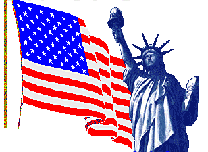|
More information about USA at www.ClearVisionBibleStudies.Com
The First Continental Congress
Continental Congress September 6, 1774, made their first official act a call for prayer, as recorded in the Journals of the Continental Congress, after just receiving the news that the British troops had attacked Boston: "Tuesday, September 6, 1774. Resolved, That the Rev. Mr. Duche' be desired to open the Congress tomorrow morning with prayers, at the Carpenter's Hall, at 9 o'clock." - September 6, 1774. The Journals of the Continental Congress 1774-1789 (Washington, D.C.: Government Printing Office, 1905), Vol. I, p. 26. David Barton, The Myth of Separation (Aledo, TX: WallBuilder Press, 1991), p. 100. The 35th Psalm, the Psalter for the Seventh day of September, was read by Rev. Mr. Duche' in the first Continental Congress. It begins: "Plead my cause, Oh, Lord, with them that strive with me, fight against them that fight against me. Take hold of buckler and shield, and rise up for my help. Draw also the spear and the battle-axe to meet those who pursue me; Say to my soul, 'I am your salvation.' Let those be ashamed and dishonored who seek my life; Let those be turned back and humiliated who devise evil against me." - September 7, 1774, Rev. Mr. Duche' reading Psalm 35. "Our Christian Heritage," Letter from Plymouth Rock (Marlborough, NH: The Plymouth Rock Foundation), p. 2-3. Catherine Millard, The Rewriting of America's History (Camp Hill, PA: Horizon House Publishers, 1991), p. 249. The Library of Congress, from the collected reports of the various patriots, records on a famous historical placard the effect of that first prayer upon Congress: "Washington was kneeling there, and Henry, Randolph, Rutledge, Lee, and Jay, and by their side there stood, bowed in reverence, the Puritan Patriots of New England, who at that moment had reason to believe that an armed soldiery was wasting their humble households. It was believed that Boston had been bombarded and destroyed. "They prayed fervently 'for America, for Congress, for the Province of Massachusetts Bay, and especially for the town of Boston,' and who can realize the emotion with which they turned imploringly to Heaven for Divine interposition and - 'It was enough' says Mr. Adams, 'to melt a heart of stone. I saw the tears gush into the eyes of the old, grave, Pacific Quakers of Philadelphia.'" - September 7, 1774. First Prayer in Congress - Beautiful Reminiscence (Washington, D.C.: Library of Congress). Gary DeMar, God and Government - A Biblical and Historical Study (Atlanta, GA: American Vision Press, 1982), Vol. I, p. 108. John S. C. Abbot, George Washington (NY: Dodd, Mead & Co., 1875, 1917), p. 187. David Barton, The Myth of Separation (Aledo, TX: WallBuilder Press, 1991), p. 101-102. Continental Congress September 1774, passed the Articles of Association, as recorded by the Secretary of Congress, Charles Thomson, in the Journals of Congress. It stated: "Article X That the late Act of Parliament for establishing... the French Laws in that extensive country now called Quebec, is dangerous in an extreme degree to the Protestant Religion and to the civil rights and liberties of all America; and therefore as men and protestant Christians, we are indispensably obliged to take all proper measures for our security." - September 1774, article 10 of the Articles of Association. Catherine Millard, The Rewriting of America's History (Camp Hill, PA: Horizon House Publishers, 1991), pp. 77-78. Continental Congress June 12, 1775, less than two months after "the shot heart 'round the world" was fired at Concord, issued a call for all citizens to fast and pray and confess their sin that the Lord God might bless the land: "And it is recommended to Christians, of all denominations, to assemble for public worship, and to abstain from servile labour and recreations on said day." - June 12, 1775. The Journals of the Continental Congress 1774-1789 (Washington, D.C.: Government Printing Office, 1905), Vol. II, p. 87. "Our Christian Heritage," Letter from Plymouth Rock (Marlborough, NH: The Plymouth Rock Foundation), p. 3. David Barton, The Myth of Separation (Aledo, TX: WallBuilder Press, 1991), p. 98. Continental Congress May 16, 1776, appointed a day of fasting and prayer for the colonies: "The Congress.... Desirous... to have people of all ranks and degrees duly impressed with a solemn sense of God's superintending providence, and of their duty, devoutly to rely... on his aid and direction... "Do earnestly recommend Friday, the 17th day of May be observed by the colonies as a day of humiliation, fasting, and prayer; that we may, with united hearts, confess and bewail our manifold sins and transgressions, and, by sincere repentance and amendment of life, appease God's righteous displeasure, and, though the merits and mediation of Jesus Christ, obtain this pardon and forgiveness." - May 16, 1776. The Journals of the Continental Congress 1774-1789 (Washington, D.C.: Government Printing Office, 1905), Vol. IV, pp. 208-209. David Barton, The Myth of Separation (Aledo, TX: WallBuilder Press, 1991), p. 103. "Our Christian Heritage," Letter from Plymouth Rock (Marlborough, NH: The Plymouth Rock Foundation), p. 3. Journal of Congress, Vol. II, p. 93. Stephen Abbott Northrop, D.D., A Cloud of Witnesses (Portland, Oregon: American Heritage Ministries, 1987), p. 287-288.
www.ClearVisionBibleStudies.Com |
